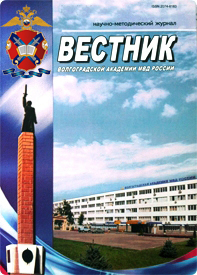The article discusses issues related to one of the elements of criminal law offenses characteristics - its objective side. Objective side of plagiarism as a crime constitutes an act caused large damage, it is the main part. The essential question in the analysis of art. 146 and 147 of the Criminal Code is the criterion of «major damage» in terms of value, as it had been, the lower limit, separate criminal offense of an administrative offense. The Act does not face this concept is concretized that introduces significant difficulties in qualification acts as crimes. In our opinion, to solve the problems of enforcement flock of 146 and 147 (Part 1) of the Criminal Code, it is necessary to amend the Criminal Code of the Russian Federation related to the definition of a particular size of major damage, to distinguish criminal behavior and an administrative offense, as well as to specify the concept of «major damage». The following sentence on the analysis of the objective side of crimes related to plagiarism concerns mostopolozheniya corresponding article in the Criminal Code. Once again it should be emphasized that it would be appropriate to transfer an article criminalizing attribution of authorship, in section VIII of the Criminal Code «economic crimes» as the object of protection in this case are the property rights of the copyright holder.
plagiarism, criminal legal description, the objective side of crimes related to plagiarism, major damage, large size, property and other rights
1. Pechnikov G. A., Bulhumova O. V., Andryuschenko T. I. Ugolovnyy process s ob'ektivnoy istinoy i «sostyazatel'no-vyigryshnoy» istinoy // Sudebnaya ekspertiza. 2011. № 1.
2. Ugolovnoe pravo Rossii. Obschaya chast': uchebnik / pod red. V. N. Kudryavceva, V. V. Luneva, A. V. Naumova. 2-e izd., pererab. i dop. M., 2006.
3. Kravec E. G. Sovremennye vozmozhnosti nakopleniya, peredachi i analiza informacii, znachimoy dlya rassledovaniya prestupleniy // Sudebnaya ekspertiza. 2010. № 2.
4. Ranee deystvovavshee Ulozhenie o nakazaniyah ugolovnyh i ispravitel'nyh 1845 g. (st. 2195-2197); Ugolovnoe Ulozhenie 1903 g. (st. 620-622); Ugolovnye kodeksy RSFSR 1922 g. (st. 198-199), 1926 g. (st. 177-178), 1960 g. (st. 141, st. 155) ustanavlivali ugolovnuyu otvetstvennost' lish' za sam fakt narusheniya prav intellektual'noy sobstvennosti vne zavisimosti ot nastupleniya kakih-libo negativnyh posledstviy ili sposoba soversheniya podobnogo narusheniya (naprimer, v krupnom razmere).
5. Kochubey A. V., Dubinin D. E. Nekotorye problemnye voprosy vyyavleniya prestupleniy, svyazannyh s plagiatom // Vestnik Volgogradskoy akademii MVD Rossii. 2009. № 4.
6. Kolotushkin S. M., Galay A. N. Informacionno-analiticheskoe obespechenie vyyavleniya, raskrytiya i rassledovaniya ekonomicheskih prestupleniy // Vestnik Volgogradskoy akademii MVD Rossii. 2009. № 4.
7. Eremin S. G., Steshenko Yu. S., Bondarevskaya N. S. Ispol'zovanie special'nyh ekonomicheskih znaniy v processual'noy forme dlya sbora ishodnoy kriminalisticheski znachimoy informacii i dokazyvaniya prestupleniy // Sudebnaya ekspertiza. 2010. № 2.
8. Dolotov R. O. Krupnyy uscherb kak pokazatel' obschestvennoy opasnosti plagiata (prisvoeniya avtorstva). M., 2009.
9. Lopashenko N. A. Osnovy ugolovno-pravovogo vozdeystviya: ugolovnoe pravo, ugolovnyy zakon, ugolovno-pravovaya politika. SPb., 2004.









